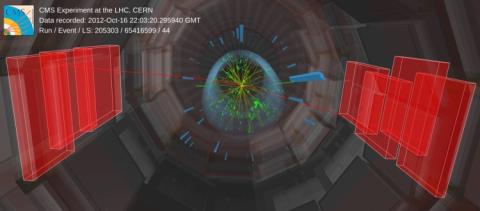CMS completes release of Run-1 proton-proton data
All proton-proton data collected by the CMS experiment during LHC Run-1 (2010-2012) are now available through the CERN Open Data Portal. Today’s release of 491 TB of collision data collected during 2012 culminates the process that started in 2014 with the very first release of research-grade open data in experimental particle physics. Completing the delivery of Run-1 data within 10 years after data taking reaffirms the CMS collaboration’s commitment to its open data policy.
The newly released data consist of 42 collision datasets from CMS data taken in early and late 2012 and count an additional 8.2 fb-1 of integrated luminosity for anyone to study. Related data assets, such as luminosity information and validated data filters, have been updated to cover the newly released data.
To foster reusability, physics analysis code examples to extract physics objects from these data are now included as CERN Open Data Portal records. This software has been successfully used to demonstrate the intricacies of the experimental particle data in the CMS Open Data workshop during the last three years. In addition, the CMS Open Data guide covers details of accessing physics objects using this software, giving open data users the possibility to expand on this example code for studies of their own interest.
The CMS Open Data group considers adaptable software examples the most efficient way to pass on the knowledge needed for research-level studies on these data. “The software included in this release also helps us preserve the huge efforts of CMS Run-1 analysts to develop physics object algorithms, corrections, and techniques that are now embedded in our MiniAOD and NanoAOD formats,” says Julie Hogan, Associate Professor of Physics at Bethel University, one of the key contributors to the CMS Open Data workshops.”They are essential ingredients for any serious effort to use these data for research. We, therefore, make every effort to recover those procedures as close as possible to the way they were originally used", adds Edgar Carrera, Professor of Physics at Universidad San Francisco de Quito (USFQ) in Ecuador, the lead organizer of the latest workshops.
The preparations for the next releases are underway, and CMS is looking forward to providing additional heavy-ion open data and proceeding with the releases of further Run-2 data.
https://cms.cern/news/cms-completes-release-its-entire-run-1-proton-proton-data

